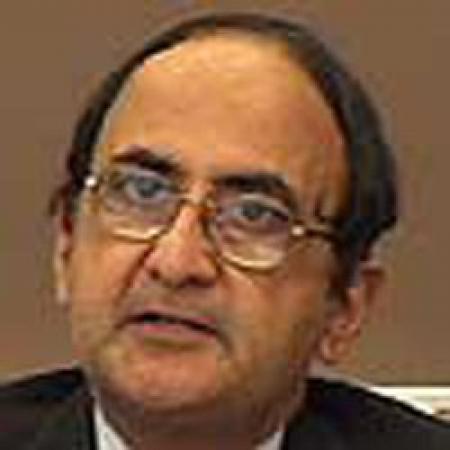ID :
124116
Tue, 05/25/2010 - 12:33
Auther :
Shortlink :
http://m.oananews.org//node/124116
The shortlink copeid
Sanctions on Iran not applicable if IAEA satisfied: Analyst

Islamabad, May 25, IRNA – A Pakistani analyst said that sanctions on Iran were not applicable.
Pakistani political and defence analyst Prof. Dr Hasan Askari Rizvi on Monday said US will not be able to apply sanctions on Iran if International Atomic Energy Agency (IAEA) is satisfied with Iran and the Islamic Republic has taken a wise decision of informing the UN watchdog on its nuclear fuel swap declaration.
Talking to IRNA, the analyst said that Iran has a right to develop nuclear program for peaceful means as per regulations of International Atomic Energy Agency (IAEA).
He, however, suggested the Iranian government to work closely with European countries and the IAEA to remove the distrust on its peaceful nuclear program.
Iran has officially notified the International Atomic Energy Agency of its nuclear fuel swap declaration with Turkey and Brazil, signed recently in Tehran.
Iran delivered a letter to the UN nuclear agency on Monday in which it informed the UN body of last week's nuclear fuel swap declaration with Turkey and Brazil.
According to article 6 of the Tehran declaration, Iran must notify the UN body of the decision within a week of its inception, and the office of IAEA Director General Yukiya Amano reportedly set May 24 as the date to receive Iranian diplomats in Vienna.
Iran has agreed to swap its low-enriched uranium (LEU) with nuclear fuel for Tehran research reactor on Turkish soil.
Under the declaration, Tehran agrees to send some 1,200 kg of its 3.5 percent-enriched uranium to Turkey in exchange for 120 kg of 20 percent-enriched uranium.
“I personally think that it was a right move by Iranian authorities to inform the IAEA on the deal”, Dr Hasan Askari Rizvi added.
Expressing his views over the nuclear swap deal, Dr Hasan Askari Rizvi said that tempt has been made to address some of the issues but few are still open which will provide US an opportunity to continue pressurizing on Iran.
The analyst said that the deal does not address whether Iran will continue to produce enriched uranium and this is what US is exploiting.
“US wants to apply sanctions on Iran but would only succeed if China and Russia agree on the idea, otherwise it would be difficult to implement sanctions”, he made it clear.
The analyst believed that international community has reservations on Iran’s nuclear program may be because of some negative propaganda. “If Iran satisfies the IAEA then US will not be able to apply sanctions”, he said.
Hasan Askari Rizvi was a visiting Professor of Pakistan Studies at Columbia University’s School of International and Public Affairs (SIPA), and the Allama Iqbal Professor at Heidelberg University, Germany. Until 2001, he was a Professor of Political Science at the Punjab University, Lahore, Pakistan.
Rizvi obtained his M.A. and Ph.D. in Political Science and International Relations from the University of Pennsylvania, and an M.Phil in Politics from the University of Leeds./end
Pakistani political and defence analyst Prof. Dr Hasan Askari Rizvi on Monday said US will not be able to apply sanctions on Iran if International Atomic Energy Agency (IAEA) is satisfied with Iran and the Islamic Republic has taken a wise decision of informing the UN watchdog on its nuclear fuel swap declaration.
Talking to IRNA, the analyst said that Iran has a right to develop nuclear program for peaceful means as per regulations of International Atomic Energy Agency (IAEA).
He, however, suggested the Iranian government to work closely with European countries and the IAEA to remove the distrust on its peaceful nuclear program.
Iran has officially notified the International Atomic Energy Agency of its nuclear fuel swap declaration with Turkey and Brazil, signed recently in Tehran.
Iran delivered a letter to the UN nuclear agency on Monday in which it informed the UN body of last week's nuclear fuel swap declaration with Turkey and Brazil.
According to article 6 of the Tehran declaration, Iran must notify the UN body of the decision within a week of its inception, and the office of IAEA Director General Yukiya Amano reportedly set May 24 as the date to receive Iranian diplomats in Vienna.
Iran has agreed to swap its low-enriched uranium (LEU) with nuclear fuel for Tehran research reactor on Turkish soil.
Under the declaration, Tehran agrees to send some 1,200 kg of its 3.5 percent-enriched uranium to Turkey in exchange for 120 kg of 20 percent-enriched uranium.
“I personally think that it was a right move by Iranian authorities to inform the IAEA on the deal”, Dr Hasan Askari Rizvi added.
Expressing his views over the nuclear swap deal, Dr Hasan Askari Rizvi said that tempt has been made to address some of the issues but few are still open which will provide US an opportunity to continue pressurizing on Iran.
The analyst said that the deal does not address whether Iran will continue to produce enriched uranium and this is what US is exploiting.
“US wants to apply sanctions on Iran but would only succeed if China and Russia agree on the idea, otherwise it would be difficult to implement sanctions”, he made it clear.
The analyst believed that international community has reservations on Iran’s nuclear program may be because of some negative propaganda. “If Iran satisfies the IAEA then US will not be able to apply sanctions”, he said.
Hasan Askari Rizvi was a visiting Professor of Pakistan Studies at Columbia University’s School of International and Public Affairs (SIPA), and the Allama Iqbal Professor at Heidelberg University, Germany. Until 2001, he was a Professor of Political Science at the Punjab University, Lahore, Pakistan.
Rizvi obtained his M.A. and Ph.D. in Political Science and International Relations from the University of Pennsylvania, and an M.Phil in Politics from the University of Leeds./end





